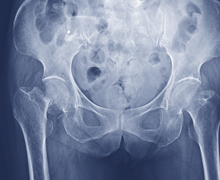
For all its benefits there are some drawbacks to being a strict vegetarian. New research from the University of Leeds in the UK found that middle-aged women who ate a vegetarian diet had a 33% higher risk of hip fracture compared to regular meat-eaters.
This study reviewed the hospital records of more than 26,000 patients to check the frequency of hip fracture over a 20-year period and scientists published their findings in the journal BMC Medicine. The researchers looked at those who were occasional meat-eaters, pescatarians (those who ate fish but not meat) and vegetarians and compared them to those who regularly ate meat.
Researchers made adjustments for factors such as smoking habits and the age of the patient and found vegetarians had an elevated risk compared to all other groups. The scientists did not offer any reason for the elevated risk but suggested people avoid being underweight, supplement with vitamin B-12 and omega-3 and increase their physical activity as ways to strengthen their bones and muscles.
"Our study highlights potential concerns regarding risk of hip fracture in women who have a vegetarian diet," said lead study author James Webster. "However, it is not warning people to abandon vegetarian diets. Vegetarian diets can vary widely from person to person and can be healthy or unhealthy, just like diets that include animal products."
Webster said the study was an important lesson regarding the need to understand what nutrients are necessary for a balanced, healthy lifestyle.
"Vegetarian diets often have lower intakes of nutrients that are linked with bone and muscle health," Webster added. "These types of nutrients generally are more abundant in meat and other animal products than in plants, such as protein, calcium, and other micronutrients. Low intake of these nutrients can lead to lower bone mineral density and muscle mass, which can make you more susceptible to hip fracture risk."
Researchers used data from the UK Women’s Cohort Study that included women between the ages of 35-69 at the outset of the study. The purpose of the study was to explore the links between diet and chronic disease across a wide range of eating patterns.
"Hip fracture is a global health issue with high economic costs that causes loss of independence, reduces quality of life, and increases risk of other health issues," said study co-author Janet Cade. "Plant-based diets have been linked with poor bone health, but there has been a lack of evidence on the links to hip fracture risk. This study is an important step in understanding the potential risk plant-based diets could present over the long-term and what can be done to mitigate those risks."
